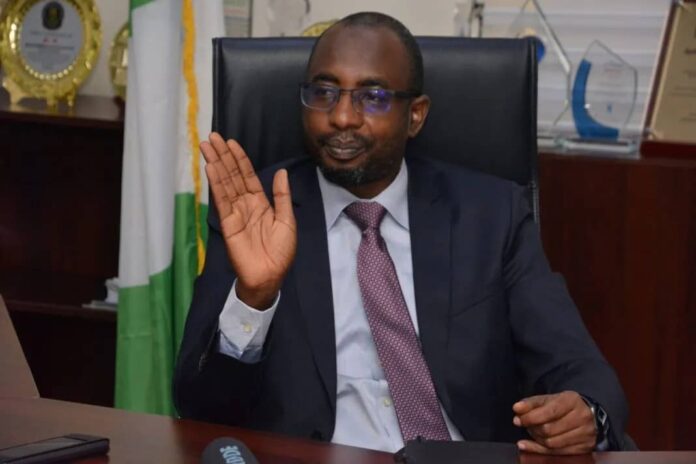That E-Government Council and NITDA’s Code of Practice
By Fom Gyem
TECHDIGEST – The month of June 2022 is quite an interesting period with a lot of new developments in the area of Information and Communication Technology (ICT), especially at enhancing digital economy.
It was the month President Muhammadu Buhari announced the composition of the Presidential Council on Digital Economy and E-government with membership from all geopolitical zone of the country.
Similarly, in the same month, the National Information Technology Development Agency (NITDA) released a draft Code of Practice for Online Platforms as a guide to prevent any kind of catastrophe in the country’s ICT sector.
Many essential areas of public-sector involvement, such as government services to citizens, healthcare, and education, have undergone digital transformation. Providing e-government services to businesses and citizens is one of the primary initiatives government is undertaking to digitalize the economy and society as a whole.
On the Council of E-Government, President Buhari directed the Minister of Communications and Digital Economy, Prof. Ali Isa Pantami to chair the council on his behalf and give regular updates.
The World Bank defines e-government as the use of information technology by government departments and other government bodies to improve business processes and service delivery. After the internet, the notion of e-government was introduced to the public sector.
Although it shares many characteristics with e-commerce in terms of providing e-services and online transactions, e-government goes much beyond e-commerce in terms of technical and commercial qualities.
READ ALSO: NITDA, JICA Open Application For Second Cohort Of iHatch Startup Incubation Programme
As Information Technology (IT) advances, many countries’ e-government systems will become “Government 2.0,” including Web 2.0 features. According to research, e-participation is a vital measure of a country’s level of e-democracy and can be connected to e-government development. E-government will enable government agencies to centralize decision-making and purchasing thereby helping to reduce costs.
Certain activities will be centralized to eliminate inefficient, costly redundancies and wastage. There are cost-saving in operating a virtual agency rather than renting (or building from scratch) an office and paying for all of its business utilities.
Furthermore, the cost of providing services online and in an electronic format eliminates the need to purchase large quantities of paper. E-government fosters a better way of life through representative and participatory democracy, transparent, open, and collaborative decision making, and close relationships and interactions between government, business, and citizens.
E-government has the potential to improve the government and citizens’ honesty, efficiency, effectiveness, and accountability in their interactions.
But e-governance is only possible if the government is willing to embrace it. Because it is not a one-day task, the government must develop and implement plans before implementing them.
Investment in telecommunication infrastructure, budget resources, ensuring security, monitoring assessment, internet connection speed, and raising public awareness about their importance are some of the measures.
Meanwhile, in line with the directive of President Buhari, NITDA to develop a Code of Practice for Interactive Computer Service Platforms/Internet Intermediaries, in collaboration with relevant regulatory agencies and stakeholders.
The agency is set to make public presentation of the draft code on Online Platforms for further review and input. This latest development is coming up five months after the Director-General of NITDA, Mr. Kashifu Inuwa at the 2022 National Protection Week in January had announced that the agency was working with key stakeholders for a code of conduct in social media engagements in Nigeria.
The Code of Practice was created in collaboration with industry stakeholders such as the Nigerian Communications Commission (NCC) and the National Broadcasting Commission (NBC), along with contributions from tech giants like Twitter, Facebook, WhatsApp, Instagram, Google, and Tik Tok.
The Nigerian government has recognized that many public and private organizations are gradually moving their businesses and information services online. That the internet is transforming the way we conduct our daily activities. That children have a significant presence online without the necessary supervision. That the information technology systems have thus become a critical infrastructure in our society that must be safeguarded, regulated, and protected against online harm.
The Nigerian government is conscious of the need to collaborate with authorized government agencies and relevant stakeholders to develop practices that will preserve and promote societal values in a democratic society and make the digital ecosystem safer for Nigerians. The ICT industry is and will continue to be, one of the largest employers.
From societal and economic perspectives, the NITDA’S Code of Practice has numerous advantages towards job creation, revenue generation, ensuring national security and promoting the image of Nigeria as a strong economy.
According to NITDA, all Platforms whose users are more than one hundred thousand (Large Service Platform) shall, be incorporated in Nigeria, have a physical contact address in Nigeria, details of which shall be available on their websites or Platforms, and provide the necessary human supervision to review and improve the use of automated tools to strengthen accuracy and fairness, checkmate bias and discrimination to ensure freedom of expression and privacy of users.
This means Twitter, Meta applications (Facebook, Instagram, WhatsApp), and Tik Tok should have built “microwork” technologies that enable breaking jobs into little components that can then be outsourced to contract employees. Contractors are frequently based in developing countries.
Microwork platforms enable businesses to dramatically reduce costs while still gaining access to qualified labor. Other industries, such as internet payment systems are affected by this trend.
As it stands, Nigeria is on the plus side of benefitting from quality governance and the digital economy as we see visible changes and significant efforts from the Ministry of Communications and Digital Economy and its agencies/parastatals.
Fom Gyem
Wuye District Abuja















